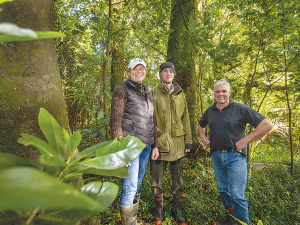Mayo, high-tech barrier help reduce possum numbers
Taranaki's Zero Possum project has entered a new phase, featuring a high-tech farmland barrier and a few squirts of mayo.
 Damien and Jane Roper and their son Jack are on a mission to restore biodiversity and return native birds to homes and farms across Taranaki.
Damien and Jane Roper and their son Jack are on a mission to restore biodiversity and return native birds to homes and farms across Taranaki.
Taranaki farmer Damien Roper says the move towards a more environmentally friendly way of farming has been a win-win.
Roper, who runs his family farm with wife Jane and son Jack, was recently rewarded for his efforts at the Taranaki Regional Council Environmental Awards, winning an award for Environmental Leadership in Dairy Farming.
Of the award, Roper says he and his family are honoured to have received it.
“We were very humbled to even be considered for the award and then we were very honoured and really appreciated the award from the TRC [Taranaki Regional Council],” Roper told Dairy News.
He says it was a “solid recognition of what we’re doing on farm and in the environmental space”.
“We’re planting all these thousands of trees and… you’re often thinking ‘is this right?’ but the recognition from the TRC absolutely says, in listening to the other award winners, we are on the right journey, we’re on the right pathway.”
Roper says that pathway to on-farm sustainability has proven to be an exciting one and one he and his family needed to be on.
They started planting on the 280ha property around 2008-2010, Roper says, but really ramped it up in 2015/16, starting to plant 1000s of trees.
“Last year we targeted 10,000. This year we’re targeting between 20,000 and 25,000 so we are ramping up.”
Roper says this has led to native flora and fauna returning to the property.
“The thing we’re seeing is a lot of native birds coming back quite quickly and the flora and fauna have all flourished,” he says.
In 2020, a nursery was set up on-farm which specialises in eco source seedlings. It now puts out 25,000 to 30,000 seedlings each year.
Roper says some of those seedlings are gifted to the local community, but most are planted on-farm.
“It’s a sort of a nursery. I didn’t really [know] how it was going to go… I learned a lot and we’ve now been fortunate enough to be able to employ a person for 15 to 20 hours a week to help me out there.”
He says the biggest hurdle was making the leap towards being more environmentally friendly on farm.
“We lowered our stocking rate and thought we were going to go broke… so that was a challenge and a bit of an uncertainty to drop our stocking rate and soften our cow numbers. It was the best move we ever did, because the productivity went up 25% and all our animal health bills dropped,” he says.
He says that by lowering the stocking rate, the farm has been able to ride out some of the extreme weather events to hit the region.
“It was a no-brainer and it just made the farming side of things easier and more environmentally friendly.
“That was a big jump and we’re seeing the benefits of that.”
He says that in farming smarter, it’s been good for both the environment and their bottom line.
“It’s a win-win,” he says. “It’s not rocket science, you don’t need a specialised major and a degree in what we’re doing.”
Controls on the movement of fruit and vegetables in the Auckland suburb of Mt Roskill have been lifted.
Fonterra farmer shareholders and unit holders are in line for another payment in April.
Farmers are being encouraged to take a closer look at the refrigerants running inside their on-farm systems, as international and domestic pressure continues to build on high global warming potential (GWP) 400-series refrigerants.
As expected, Fonterra has lifted its 2025-26 forecast farmgate milk price mid-point to $9.50/kgMS.
Bovonic says a return on investment study has found its automated mastitis detection technology, QuadSense, is delivering financial, labour, and animal-health benefits on New Zealand dairy farms worth an estimated $29,547 per season.
Pāmu has welcomed ten new apprentices into its 2026 intake, marking the second year of a scheme designed to equip the next generation of farmers with the skills, knowledge, and experience needed for a thriving career in agriculture.
OPINION: Staying with politics, with less than nine months to go before the general elections, there’s confusion in the Labour…
OPINION: Winston Peters' tirade against the free trade deal stitched with India may not be all political posturing by the…